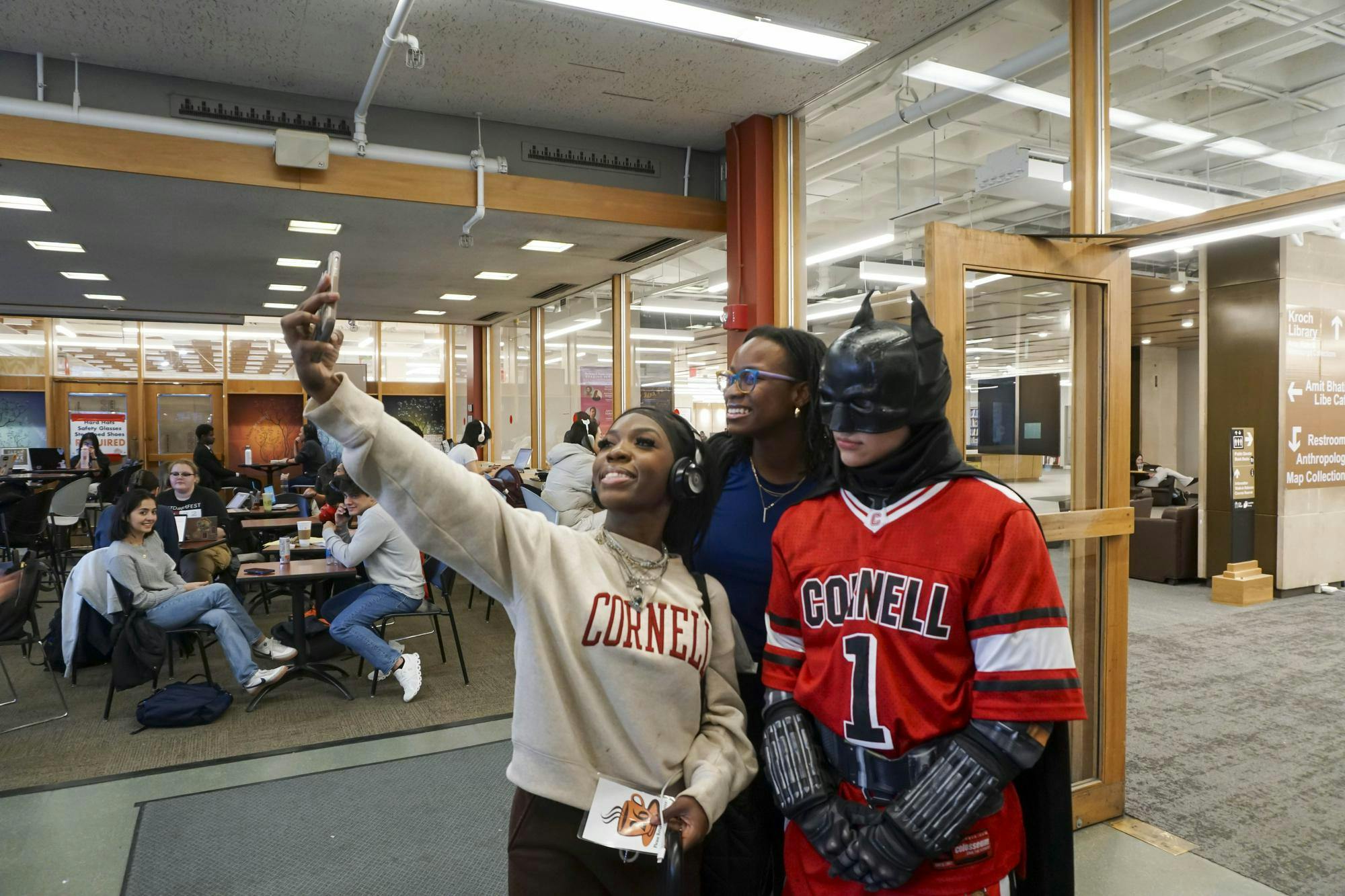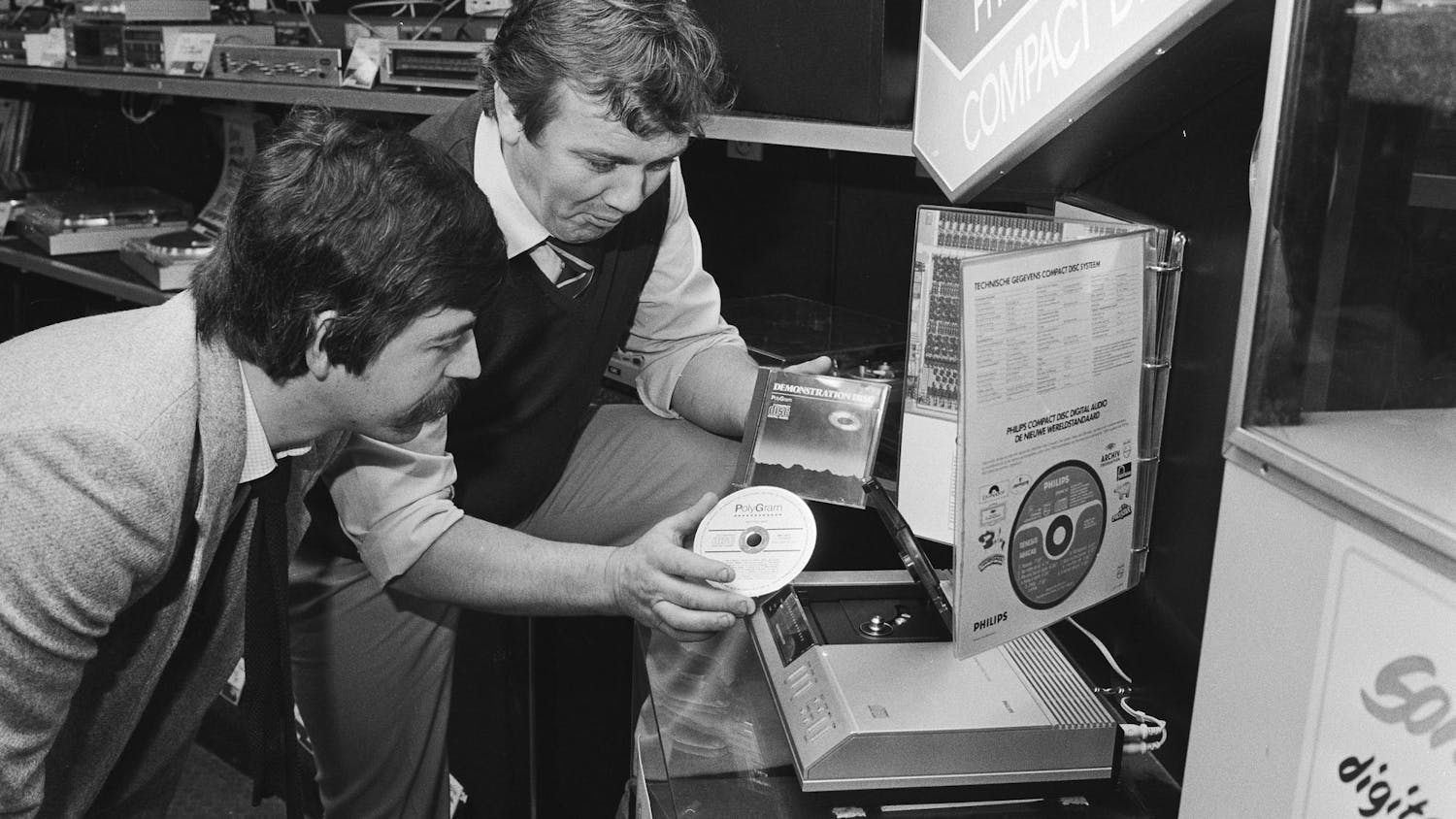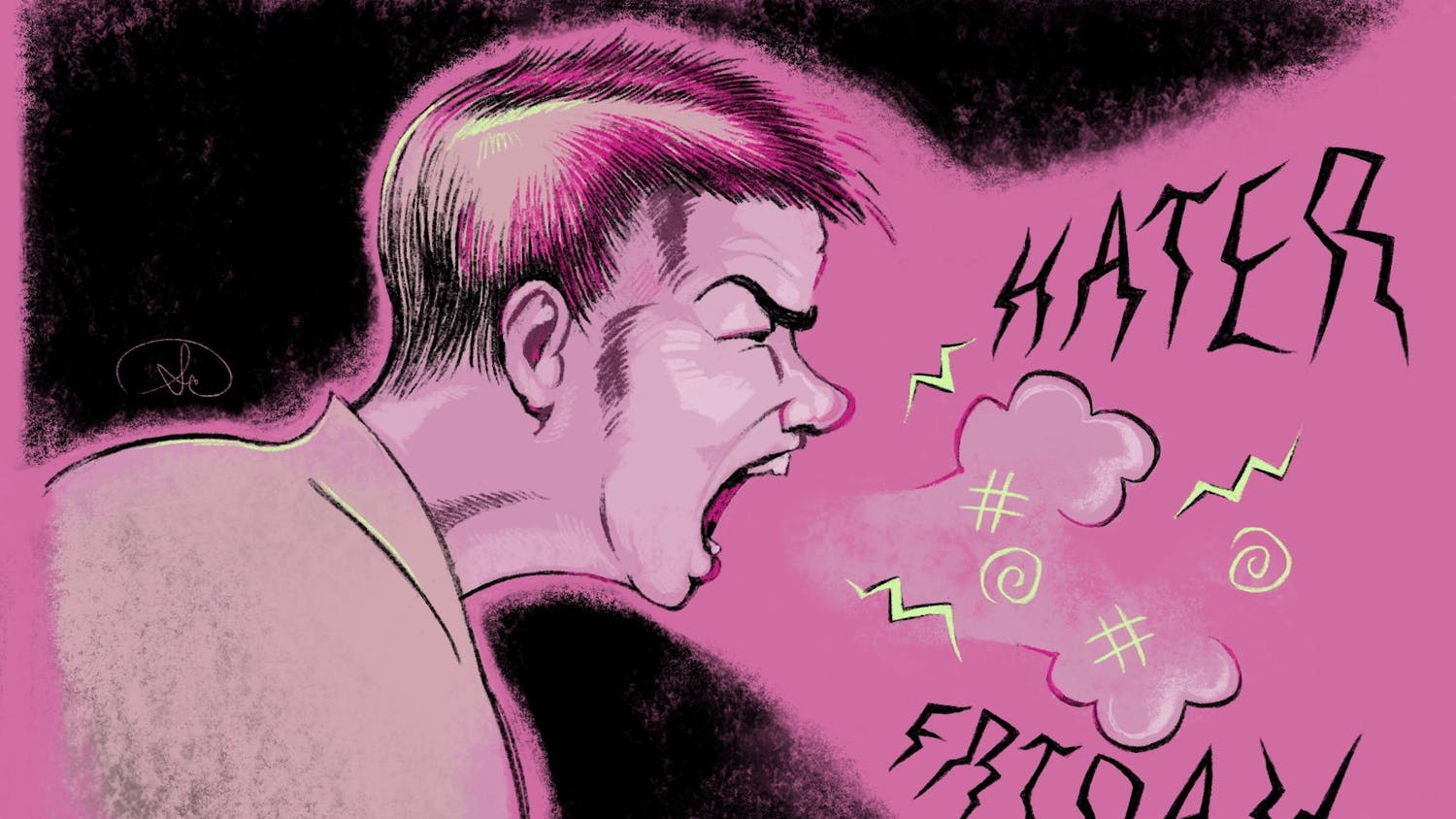If you’ve been in the Robert Purcell Community Center after midnight, perhaps you’ve seen a man with a mask, a cape and a soundtrack: our very own Cornell Batman.
Taking a selfie with the Cornell Batman should be on the 161 Things Every Cornellian Should Do list. Meeting him is like a canon event of the freshman experience. You might also see him at an Ice Hockey game at Lynah Rink, a frat party or maybe he’s the student sitting next to you in class (but you wouldn’t know that). The mask preserves his anonymity, but it also helps express his values. It represents both the ability to hide and the ability to show yourself the most. After taking that aforementioned selfie with him, you might want to sit down and chat. That’s exactly what we did. In that hour, the Cornell Batman demonstrated that his persona is more than a side gig.
It’s easy to look at this — to look at the costume — and think, “This is silly.” It’s unserious, it’s whimsical, it’s fun. However, no action of his is without intention. For the Cornell Batman, this journey started with his love for the character. He said, “I’ve always been a big Batman fan, my entire life … I've always looked up to him. I think out of all the superheroes, he's the coolest because he has no powers, and he perseveres only with grit and mental willpower.” When the Cornell Batman wears the costume, he also embraces the character, because “Batman teaches us how to fail.” He explained, “If you're constantly good at everything, you'll never improve and break past your limits.” When moving into college, the new Batman movie with Robert Pattinson had just come out. The Cornell Batman felt inspired; Pattinson’s performance was more comic-book accurate than any other performance. One week before Halloween, he donned the costume for the first time. “I decided to do a test run. And people loved it. This was during prelims, and I noticed that people were laughing and smiling, and a lot of people were like, ‘You made my day,’ ‘You made my night,’ and they would ask for photos, and I realized that I was starting to establish something here.”
And he’s right. He really has established something.

On Instagram, @the_cornell_batman has over 1,400 followers. He has endorsed students for positions such as Transfer, Freshman and ILR Representative. He keeps track of every sports game he has attended. We talked to Sohini Singh ’26, a member of the Women’s Wrestling club and a friend of Batman. She told us about the first Women’s Wrestling dual against Harvard University and MIT, saying, “When it got announced on our Instagram, the first thing [The Cornell Batman] said, he DM'd it to me, he was like, ‘I'll be there.’” Although he had a conflicting event, he told Singh, “I'm going to make a conscious effort to pop in and be there because it's so important to me that your athletics are promoted on this campus.” Batman also supported the Women’s Ice Hockey team during the ECAC Championship. Singh stated, “I also want to emphasize, he's a figure of support, but that also comes from the fact that he, as a person, has genuinely such good intentions. I feel like a lot of people talk about wanting to give support, wanting to do things, but he's very active about his goals … [and] about the execution, which is something that I really admire.”
Beyond athletics, Batman has bolstered morale on campus by supporting the residential community. Faculty Residential Advisor and Professor of Economics, Stephanie Thomas, learned about the Cornell Batman from a student in one of her classes. This led her to meet with Batman to learn more about his “mission.” She told us, “He wants everybody on the campus to feel included and part of the community, and like they have people that they can rely and count on.” After speaking with Batman, Thomas decided to host an event for the Low Rise community on North Campus called “Bystander Batman!”, which intended to talk about safety and being an active bystander. Thomas talked about the responsibility of active bystanders, stating, “I do think that we all have a responsibility to build our community and make our community what we would like it to be.” She also reflected on what Batman has done and how we can learn from him: “I think that Cornell Batman was feeling some of these things that we all feel, right? A sense of disconnection or maybe a longing for community … and rather than getting angry about it or getting sad about it, he's just like, ‘Well, if I'm feeling this way, other people are feeling this way too, right? And so, what can I do? What can I do, one person, what can I do to make a difference?’”
Certainly, the Cornell Batman is making an impact. His superhero persona has become an iconic figure on campus and, more than that, is making a difference for the man behind the mask as well. True to form, he likens the experience to a scene from the comics: “Wonder Woman asks all of [the superheroes] to say their real name. Wonder Woman says Diana Prince. Superman says Kal-El. Batman does not say Bruce Wayne. Batman says Batman, and that is considered a truth. … Bruce Wayne is the mask and Batman is the true identity. It's almost like covering himself up … reveals himself more. And that does that for me too, you know. I'm not saying I'm not myself out of the mask. … The mask shows you who you are.” The Cornell Batman finds a certain freedom in being able to act without judgment, without second thought, all because of the mask. He becomes more of himself because he’s uninhibited by others’ perceptions. Sure, more eyes may be turned his way as Batman, but they’re looking at the character and not the man underneath. “It gives me some confidence — my anonymity, my secret identity. I'll be on my way to class, surrounded by hundreds of people who have no idea who I am, but if I want to put on the mask, they’d absolutely know who I am.” In that sense, Batman never really leaves him. It’s just a truer manifestation of who he is — someone who genuinely cares. For Andrew Day ’28, the mask is no obstacle in becoming a friend of Batman. Day says, “I think it actually did the opposite in a weird way … that mask is being used to symbolize something, so I think that was just a further extension of the role and what his interests were. I never saw it as a real disconnect.” Day became friends with Batman in the RPCC Esports Gaming Lounge and bonded over their favorite sports teams and video games, playing one-on-one into the early morning hours. Just as Day said, the mask only emphasizes his values, not reducing his identity. Anyone can be a friend of the Cornell Batman, and perhaps everyone who supports him, in a way, already is a friend.

To call the Cornell Batman a mere gag would be to do a disservice to the palpable impact he’s had on Cornell and the community. We talked to one of Batman’s friends, Addison ’27, who spoke to how valuable his presence really is. “It gives campus something to remember other than … you know, I was part of this project team or I got this grade in this class or I joined these clubs … it sort of gives us something not connected to, you know, our careers and our future to just remember and to just appreciate and to experience and I think that your day probably got better from just seeing a glimpse of a guy walking around in a Batman suit and, if nothing else, that's something memorable that probably lifted your mood, and that's something. Because of all that is meaningful, and I think that people should at least appreciate that aspect of it because, in the grand scheme of things it might seem like a small, small part of your day, but why not just stop and appreciate it for a second?” Addison’s sentiment isn’t an unpopular one. Nicholas Blasi ’28 agreed, saying, “I think that you definitely could see it as unserious … but at the end of the day … it's exactly what we need here at Cornell.” Blasi also reflected on his freshman experience and seeing Batman for the first time in RPCC, “I think it was the perfect representation of everyone at Cornell, if that makes sense. I think Cornell might be very serious when it comes to the school, but … the shift when he walked in the room and you could see everyone go from like their computers to very happy … everyone after is talking like ‘did you see that guy?’ That first welcome to Cornell, it gave me a sort of feeling that even though everyone's very smart, everyone's in it to study, do well in classes, everyone has a light in [themselves] … I think he does bring that out [in] everyone in the community.”
As much as there is left to say, it seems only fair to let the Cornell Batman himself have the last word, to really get at the heart of what he does:
“The Batman first started as a simple gag, meant to make people smile and laugh. But it’s evolved over the last two years, and now I’m using my platform to really work towards making an impact. More specifically, I’d like to unite my peers together more. Humanity needs to look out for one another, and we haven’t been doing that for quite some time now. I’d like to change that, and to start, I think I’d like to start by improving the mental health of my community. It’s the biggest issue here, and it’s led to an egregiously high suicide rate here. Point is, I now have a platform … and I have the opportunity to use it for good. So I want to do that. I want to use what I’ve built to really stand for something.”
Sophia Romanov Imber is a freshman in the College of Arts and Sciences. She can be reached at sromanovimber@cornellsun.com.
Melissa Moon is a freshman in the College of Arts and Sciences. She can be reached at mmoon@cornellsun.com.
Eric Han also contributed to this article. He is a junior in the College of Arts and Sciences. He can be reached at ehan@cornellsun.com.
Melissa Moon is a member of the Class of 2028 in the College of Arts and Sciences. She is an Assistant Arts & Culture Editor on the 143rd Editorial Board. She can be reached at mmoon@cornellsun.com.
Sophia Romanov Imber is a member of the Class of 2028 in the College of Arts and Sciences. She is an assistant arts editor of the 143rd Editorial Board. She can be reached at sromanovimber@cornellsun.com.











